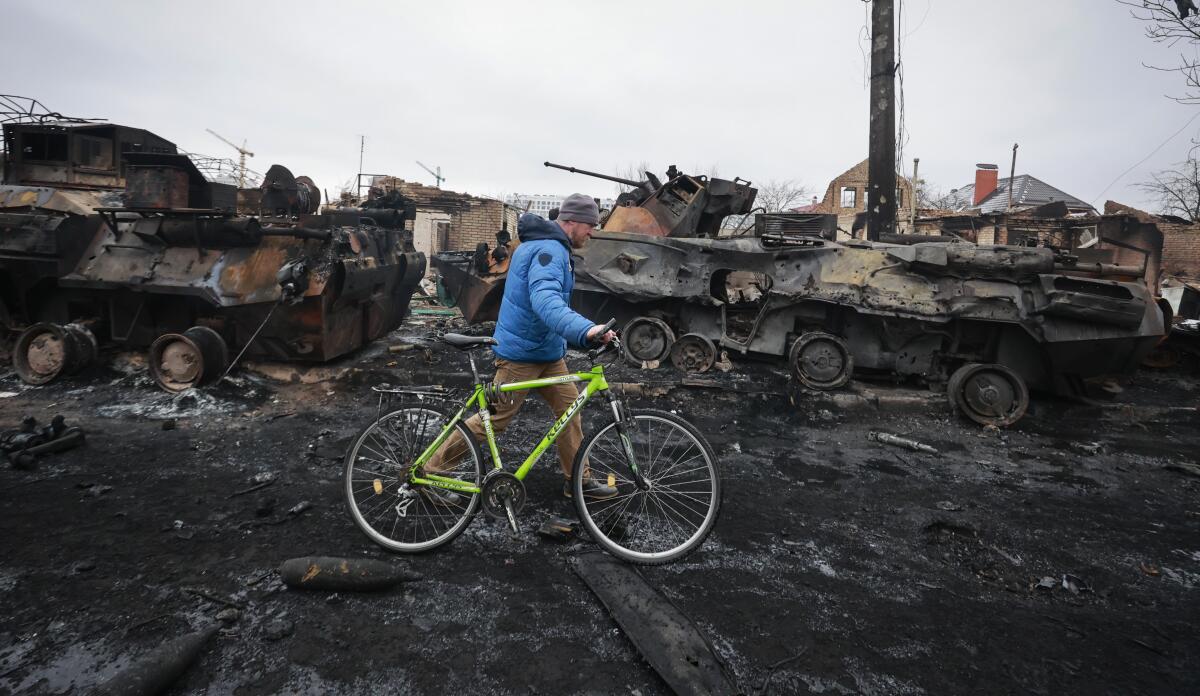The ultimate sanction: Listing Russia as a state sponsor of terrorism

- Share via
Almost daily since Russia’s invasion of Ukraine last week, the United States and allies in Europe and Asia have been tightening the sanctions vise on Moscow. Yet even devastating blows to the Russian state and its economy did not give President Vladimir Putin pause as he unleashed a brutal overnight assault on Ukraine’s second-largest city.
“The attack on Kharkiv is a war crime,” Ukrainian President Volodymyr Zelensky said Tuesday. “This is state terrorism of the Russian Federation.”
Zelensky’s words were no doubt carefully chosen. Putin’s grand ambition is to be recognized as a great leader of a great power, and only one sanction in the U.S. arsenal would tarnish Putin’s image and his country’s reputation enough to potentially bring him back from the brink of world conflict. Officially deeming Russia as a terrorist state would even further stain the Kremlin’s reputation and relegate Russia to pariah status.
There is no anvil within the sanctions world as economically blunt as the U.S. government’s “state sponsors of terrorism” designation. The State Department has been adding countries to the list since 1979, when Syria became the first. Today, four countries are on the list: Cuba, North Korea, Iran and Syria.
Sometimes a state comes off the list because it has reformed its behavior and returned to the international fold, or because it has undergone a change of leadership. In my former role at the State Department, I led the office that developed the evidentiary basis for removing Cuba and North Korea (the latter being added back to the list on my watch).
Designating a country as a state sponsor of terrorism would hurt the target country’s financial system, potentially:
- freezing of the country’s assets in the United States, including real estate;
- requiring the U.S. to veto efforts of that country to secure World Bank or International Monetary Fund loans;
- prohibiting a wide variety of dual-use exports;
- requiring the U.S. to take economic action against countries that continue to do business with the targeted country.
Perhaps most importantly, Russia would join a very small table of pariah states. The world’s collective backs, and banks, would turn against Putin, and his reputation as a great statesman — his grand hope, after all — would be unlikely to recover.
Adding Russia to the state sponsors of terrorism list would be the nuclear economic option and a precision strike against Putin’s ego. The decision should not be made in haste. Even at the height of the Cold War, the United States did not sanction the Soviet Union with this designation, although Soviets were providing support to a wide range of terrorist actors throughout the 1970s and 1980s. Yet, the Trump administration in 2018 considered adding Russia to the list for its attempted assassination of Sergei Skripal, a former Russian spy and defector.
The Biden administration would be on solid ground adding the Russian Federation to the list. The various underlying laws that guide state sponsor of terrorism determinations allow for the United States to consider a broad set of activities, even scouring the last decade for terrorist malfeasance.
The Kremlin’s attack on Ukraine, although a gross violation of international law, is not terrorism for the purposes of this designation. But Russia has provided plenty of other grounds in the past decade. To designate a country as a state sponsor of terrorism, the secretary of state must determine that the nation’s government has repeatedly provided support for acts of international terrorism, such as assassinations or financing terrorist groups.
When North Korea was added back to the list in 2018, the key act that allowed for the designation was the murder of Kim Jong-nam, Kim Jong-un’s half brother, by North Korean-sponsored assassins. Like the North Korea assassination, Russia has conducted a long list of political assassination attempts to strike fear into the hearts of its enemies. For one, Russia’s effort to kill Skripal in England would meet the criteria.
A country can be added to the list only if there are at least two examples of state-supported terrorism. We don’t have to look far, though, to find another clear-cut example. Even today, Russia provides sanctuary to a U.S.-designated terrorist group, the Russian Imperial Movement, which operates with impunity in Russian territory. It is a group that has trained terrorists to carry out an attack in Sweden, and it has served as a proxy force for Russia in Crimea.
The great irony in Putin’s justification to invade Ukraine, “de-Nazification” as he cynically calls it, is that his Russia is a terrorist-supporting state. Adding Russia to the state sponsors of terrorism list should be on the table. It may be the only sanction tool that could bring shame and regret to Russia’s cruel leader.
Jason M. Blazakis is a professor of practice at the Middlebury Institute of International Studies. He was director of the State Department’s Counterterrorism Finance and Designations Office in the Bureau of Counterterrorism from 2008 to 2018.
More to Read
A cure for the common opinion
Get thought-provoking perspectives with our weekly newsletter.
You may occasionally receive promotional content from the Los Angeles Times.









